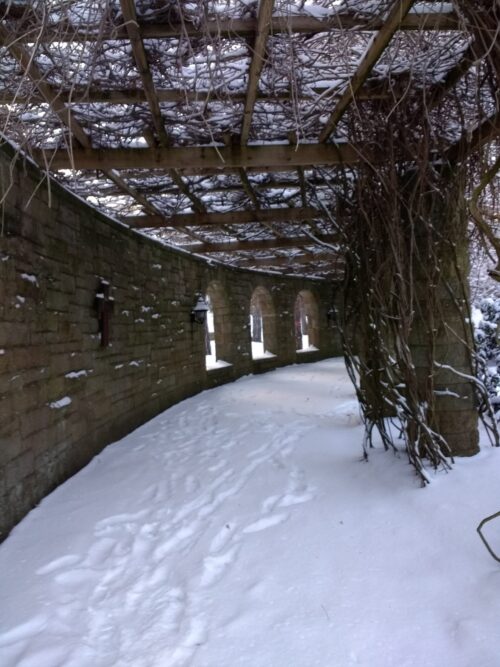Franciscan priest Richard Rohr calls the Liminal Space as the “in between space.”
This space that exists between an event that is life altering in ways that is not yet comprehended, yet holds the awareness that life as we know it will forever be changed.
I write this on the Saturday following Good Friday, after preparing music for the Easter Service tomorrow, which like everything else in the Coronavirus era, will be streaming on Facebook Live.
The parallel awareness of living in the in between space in Coronavirus time while following the story of Good Friday landed last night after our housemate Leah and I did a Taize Service of Chant for Good Friday which we streamed live on Facebook.
The Passion Narratives in the Gospels of the New Testament generally begin with Jesus’s arrest and end with his burial.
According to these narratives, on the third day after his death, Jesus was resurrected in the flesh, not as a ghost like figure, but bearing the wounds of his brutal death.
So what did Jesus do in this liminal space? Between his death and his appearance to the women?
No one really has a concrete understanding of what occurred in this in between time between death and resurrection.
Roman Catholic, Eastern Orthodox and most mainline Protestant churches teach that Jesus descended to the realm of the dead on Holy Saturday to save righteous souls, such as the Hebrew patriarchs, who died before his crucifixion.
If that is the case, that certainly sounds like a fairly intense trip!
I am also quite certain with my awareness of the heart of Jesus, the matriarchs and those unnamed humble lovers of God would have likely been in the front seat of any Jesus escorted chariot rides to the Kingdom. Jesus might have even suggested to the patriarchs to help drive the chariot. Some of them were not very nice.
Regardless if you are a follower of Jesus or not, life on this planet was forever altered and never the same.
It is my observation that all of us experience being in liminal space. It usually occurs after a monumental shift such as the unexpected loss of a job, a divorce, a death or anything that causes us to question our basic understanding of the world.
My daughter Riley celebrates her 20th birthday this week. We found out during the 20th week of pregnancy that Riley had a neural tube defect called myelomeningocele, a form of spina bifida that impacts gross and fine motor, brain, bowel and bladder function.
Long story short, we ended up going across the state of Pennsylvania to Children’s Hospital in Philadelphia and University of Pennsylvania to undergo a then experimental in utero surgery to repair the defect.
In our liminal space, we spent 4 months in Philadelphia separated from family and friends. John and Johnny (who came back and forth on the train with my mom) lived in the Ronald McDonald House in Camden, New Jersey while I was bed bound in the University of Pennsylvania Hospital.
Riley decided to enter the world a bit early at 29 weeks at 3 lbs and spent 2 months in the NICU while we were upgraded to the Ronald McDonald House in Philly.
Coming home from this experience was surreal.
Life as we knew it had completely changed.
We now had Early Intervention in our home 3 times a week.
We had to figure out how to access disability services through healthcare, and eventually the educational system.
I also woke up to the awareness that I lacked prior to Riley that our society was created by able bodied people (who also happened to be white and male).
So living in the liminal space and allowing this time to shape and fold me also informed an expansion in my value system.
This expansion supported my opening my eyes up to inclusion and belonging, to who gets to have access to resources and who does not and who gets to freely, safely and easily navigate through time and space and who does not.
Life changed as I knew it and this ever expanding awareness guides my own desire to grow in understanding and engage in activism for equity in all intersections of identity.
Being in liminal space collectively happened after Jesus’s death and resurrection in the immediate geographic regions of Jesus’s life and ministry that we know now, eventually spread to all corners of the globe.
Jesus even influenced the way time was measured and numbered by some of the earliest church leaders who established calendars that designated the time Before Christ (BC) and Anno Domini (AD, which is a confusing Latin phrase that means something like, “In the year Our Lord was born”).
We experience being in the liminal space in the collective after natural disasters, deaths of major iconic figures and in the USA, after 9/11, and in my own community in Johnstown, Pa after the 1977 flood that occurred in my lifetime.
Currently with the Coronavirus, we are globally in this liminal space.
Everyone on the planet is impacted and we really don’t know what life will look like on the other side of the pandemic.
We video chatted with my sister and her family in Australia tonight, literally on the other side of the world facing the same situations and problems, although with a much more responsive leadership in government and stronger safety nets that were already present for people.
We will likely exist in this liminal space for quite some time.
The Celtic imagination does not fear this space but sees it as full of power, potential, possibility and grace.
In this framework, the mundane and the sacred connect and inform one another.
There is this enormous potential for transformation and creativity.
There are people that abide in this space often that are comfortable with uncertainty, shifting paradigms and exist beyond the duality of the sacred and the profane.
Visit the works of Leonard Cohen, John O’Donohue, Vanessa German, Clarissa Pinkola Estes and others who see beyond the false security of man made systems and institutions.
We can, in this liminal space, seek to be informed by the higher values of reciprocity that are showing up in the army of people operating sewing machines to provide protection in the form of masks, that our broken health care systems and government systems have been unable to mobilize to provide.
We can see that despite our physical distancing, our souls long for connection and we are finding that in creative and innovative uses of technology.
One of my childhood friends has created a project this week where she takes pictures of people on their front porch so we can see one another via this medium. This is especially lovely as America, in love with the hyper individualized society has largely moved to the back yard deck with the fenced in yard.
Life will forever be altered because of this pandemic.
For many, sadly because of loss of life of beloved family and/or friends, still others, the economic impact.
So how will we allow transformation that can be informed by higher values of compassion?
How can we lean in more to living and practicing collective care?
How will this experience shape and change us in ways that can allow us all to land in every level of society into a more generous way of being together?
This doesn’t mean we won’t occasionally be a complete asshole during this pandemic and have selfish and self pitying thoughts and feelings.
It means we will allow these experiences to move through us, rather than set up camp. It means we will lean into our own inquiry with uncertainty.
It means we release attachment about what we consider normalcy.
It means we move from the standard “I” and “me” in our culture to a “We” and an “Us”.
We know the story of Easter after the liminal space.
Love Wins.
Hopefully, whatever you believe, that awareness offers you some fortification during all of our time in the liminal space.
Love Wins.




